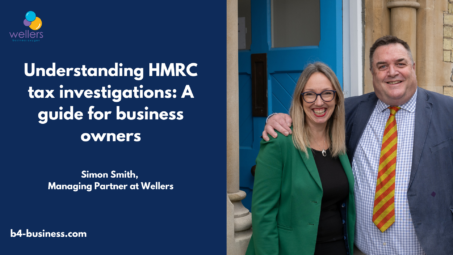
How to avoid the danger of customer and supplier over-reliance?
Simon Smith, Partner at Oxfordshire based accountancy firm, Wellers, which has offices in Oxford, Banbury, Thame, and London, discusses how SME businesses can avoid the pitfalls of relying on a select few customers and suppliers.
Business owners are often told to diversify their offering in order to broaden their appeal and make more sales. However, little advice is given on exactly how to achieve this. Ask yourself, as a business owner, if you were to make a list of your customer base and all of your suppliers, would there be a variety of people?
If not, then it may be time to diversify. Especially during a time when the UK is experiencing an unprecedented level of economic uncertainty.
The dangers of relying on a few
Consumer’s purchasing decisions are determined by a number of things, including market trends, new products, or a change in view; it could even be a social media post they’ve seen and want to buy into. However, there is real danger if all a business’ customers are too similar because if something in the market changes or there is a shinier product being offered by a competitor, they may all move onto something new.
If yours is a B2B model, then over reliance on one customer for most of your products or service sales can prove fatal. If they no longer place orders, then your turnover is in danger of drying up.
Adversely, what happens if products are flying off the shelf but an over-reliance on one or two suppliers means that stock cannot be made fast enough? Or they are experiencing a technical issue which means they have to halt their operations? Sure, these could be viewed as worst case scenarios, but if they were to crop up, there needs to be a plan in place to overcome them, and quickly.
It’s therefore easy to see how relying on any one customer type or supplier is a dangerous approach. However, there are ways around falling into this trap, it just involves a bit of lateral thinking. Here’s three ways to avoid the pitfalls of customer overreliance:
1. Step into the Public Relations ring
Public relations is a crucial part of the marketing mix. It’s what communicates a business’ offerings and approach in a way that resonates and connects with both existing customers and potential new ones. One of the best ways to do this is by releasing new and innovative products to market and communicating that they are available.
It’s also important to assess the best way to connect with these potential new customers because it isn’t always via the traditional media relations route. For example, a company could use research, leverage an event, use social media, create insightful blogs, or host a podcast, the list goes on.
2. Convert followers into buyers
It’s a common occurrence to see brands working hard to gain a large social media following, many of which engage with all of their posts, only to see them fail to convert them into paying customers that repeat purchase.
Repeat purchasers are important, after all, although only eight percent of customers are likely to repeat purchase, this equates to 40 percent of overall sales, on average, according to the Adobe Digital Index Report. Naturally, an organisation’s social media following will be broad and diverse. People don’t always follow a business because they wish to purchase from them, they may just enjoy the content that they generate. However, it’s a great place to begin the conversion process. To do this successfully, brands should consider different marketing elements. This could be anything from a contest to advice, and by doing so, a business is able to engage with its current consumer base but also appeal to others outside of their target market.
3. Get personal
Generic emails are easily forgotten and often go unread. But nothing beats a personal conversation with someone. Not only is it a way to differentiate a business from its competition, but it builds a stronger connection.
Avoiding supplier overreliance
Now that we’ve discussed how to broaden customer bases, its also important to evaluate from a supplier standpoint.
One way to reduce risk is to use more than one supplier. On the face of it, this may sound more risky, but although it means more work, the reality is that depending on a businesses needs at any one time, there will always likely to be the right supplier on hand to deal with the situation.
Take an uncontrollable matter like extreme weather, for example. Although every business owner likes to think they are in control 100 percent of the time, the reality is that this is impossible. In the case of extreme weather, it may prevent a suppliers’ ability to transport products leaving a business with empty shelves. However, it may be that a different supplier in another location is able to make the journey.
Uncontrollable factors are wide-ranging, extreme weather is just one example. Another would be the current COVID-19 crisis we find ourselves in, which will have a significant economic impact. For example, if a long-standing supplier goes out of business, and your organisation has to spend time finding a suitable alternative, that could be days, or even weeks, without receiving supplies which will impact on the bottom line.
By looking at over-reliance when it is not a problem, you can futureproof the business for many any eventualities down the line.
Conclusion
Although diversifying customers and suppliers is a big undertaking that takes time and effort, it is a beneficial task in the long run. It can provide a business with more security and broadens the appeal to potential purchasers because they are able to see a viable future that will generate a return on their investment.
To get personalised advice for your business from Wellers, please visit www.wellersaccountants.co.uk
More in Accountants

Why having an audit can boost your business
Many directors will wince at the prospect of an audit, seeing it as a necessary evil to meet statutory obligations.

FRC Proposes Major Overhaul of Auditing Standards
In a bold move, the Financial Reporting Council (FRC) has unveiled proposed changes to auditing standards that could have a major impact on the financial world, according to chartered accountants and business advisors Whitley Stimpson.

Whitley Stimpson shines as finalist for top national award
Service Charge Accountancy specialist Jonathan Walton of Whitley Stimpson has been recognised for his outstanding work in the field by being shortlisted for a prestigious property industry award.
From this author

Budget 2024 review: A bitter pill for SMEs?
Tom Biggs, Partner at Wellers, the Oxford-based small business accountants, discusses the latest Budget and the impact it will have on SMEs.

Understanding HMRC tax investigations: A guide for business owners
Simon Smith, Managing Partner at Wellers, discusses what business owners need to know about tax investigations, including whether you could be a target.

Evolution and Growth for Oxfordshire’s Wellers
Simon Smith takes the helm as Managing Partner

